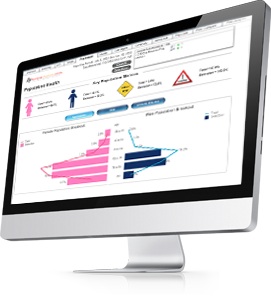 Rise Health, whose Ascend technology is pictured, is an investment of Lee Wrubel.
Rise Health, whose Ascend technology is pictured, is an investment of Lee Wrubel.
At the Partners Healthcare Connected Health Symposium in Boston, Massachusetts, four major investors in digital health talked about the state of the health investment landscape.
In a panel moderated by Bill Geary of Northbridge Venture Partners, Andrew Firlik and Lee Wrubel from Foundation Medical Partners and Michael Greeley from Flybridge Capital Partners contended that digital health is at something of a tipping point because apps, the internet, and provider back-end systems like EMRs are now advanced and widespread enough to foster low-cost innovation.
"We have the framework, the infrastructure now largely in place for all of these incredible value add technologies to be derived," Greeley said. "I think we're poised for some really interesting companies that will be multibillion dollar outcomes."
Greeley used the example of Predilytics, a Flybridge-backed company that provides population management through data analytics. He said the company was able to reach profitability much faster and with a much smaller initial investment than if it had launched 10 years ago.
"We're seeing the ability on relatively small dollars to build really compelling tools that providers absolutely need to run their businesses," he said. "It's so incredibly disruptive to legacy vendors, but in healthcare we needed to see that cost curve collapse to really get innovative products."
Two more factors that still need to change to make the environment even more ripe for innovation are regulation and payment models, according to the panelists.
"The other elephant in the room is that we're adding major increments of value for healthcare without having to interface with the FDA or Medicare," Firlik said of some of the innovations he's invested in. "Those have been a drag on capital in the healthcare space."
Even as regulatory standards develop to accommodate technology, technology is also evolving to fall under less strenuously regulated umbrellas, Firlik suggested. He used the example of a company he invests in that's working on a mouth guard concussion sensor.
"As soon as we don't invade the body, we have a lower regulatory barrier," he said, "With concussions, it's a knowledge problem as much as it is a behavioral issue."
Payment models are changing in different ways. For one thing, insurance reform is putting more payment burden on the consumer.
"The money's starting to flow very differently than it has for the past 100 years," Wrubel said. "Consumers are being asked to pay more and more for their healthcare bill, and that's going to drive consumers to think of healthcare the way they think of everything else."
At the same time, accountable care payment models, like bundled payments, will give healthcare providers more purchasing freedom as well.
"The payer is going to be Mt. Sinai or Partners Healthcare," said Wrubel. "In accountable care, large buckets of money will be passed to providers and they will be free from the reimbursement codes that have restrained innovation."
Lower-cost, more patient-driven care could leave health insurers in a potentially tough position, Firlik pointed out.
"Some of the companies you think might be the biggest loser could turn out to be the biggest winner," he said. "The obvious person that's left in the cold when the music stops here is the insurance company. On the other hand, insurers have an enormous advantage in terms of understanding how data drives healthcare, so a strategy change could put them in a very strong position. It's all about how they navigate what's going to be a very turbulent time in healthcare."
















